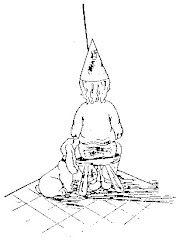It’s amazing sometimes to think about what we Christians are truly telling each other – and ourselves. So often (too often) we say things without understanding what it is we’re saying, and this causes others (and ourselves) to believe things which simply are not true.
We don’t realize this, of course. All we know is that we’ve quoted scripture. But what was our interpretation of that verse we just quoted?
I didn’t become a Christian until my nineteenth birthday. It was early in the morning. About four o’clock. It was a very relieving experience to put my fate in God’s hands. You see, I had come to the realization that I had mucked up my life something terrible, and only God could fix it. If he would.
My first year was something of a honeymoon. All smiles and sunshine. Then I began the process of actually living a life instead of sitting back and watching.
Some of my biggest struggles have had to do with claiming the promises of God. So many people kept telling me that all I had to do was “believe”, and then it would happen. It didn’t seem right to me then and it doesn’t seem right to me now. True, God has told us things such as the following:
And Jesus answered them, “Truly, I say to you, if you have faith and never doubt, you will not only do what has been done to the fig tree, but even if you say to this mountain, ‘Be taken up and cast into the sea,’ it will be done. And whatever you ask in prayer, you will receive, if you have faith.” Matthew 21:21-22 Revised Standard Version
That is a true statement, or God would not have said it.
So how do we reconcile our believing in something that does NOT happen? We believe someone will recover from an illness or injury. We are convinced of it, and act accordingly. And then they die?
We are convinced we will marry someone. And then they marry someone else? The promotion does not come our way. We lose our job. We lose our house. All in despite of what we believe. Does this refute what we just read from the Gospel of Matthew?
I think not.
I think our understanding of what Jesus told his disciples is skewed. That’s the problem. So often Jesus was frustrated with his disciples because he would tell them things and they just wouldn’t get it. I don’t think we’re any different. We don’t always get it either.
Take this verse:
I can do all things in him to strengthens me. Philippians 4:13 Revised Standard Version
What does that mean for us in our daily life? What have we told ourselves it means?
We (Christians) quote this verse often. But I wonder – do we believe it? It’s easy to say we believe it. But do we? And do we understand what it’s telling us?
The problem is that we Christians too often believe in “magic” more than we believe in the power of God. We think this verse means we can suddenly do things for which we have no training or ability. That has happened, certainly. But that is not the normal course of how God operates. God uses the people and things of this world to achieve his purposes for the world. And he uses our own knowledge and abilities to achieve things in our lives.
So how is this applied in real life?
If you wish to be a great athlete, then you must train your body for athletics. If you wish to be knowledgeable about this or that, then you must study this or that to gain the knowledge. And don’t expect it to be easy. It will be just as difficult for the Christian as the non-Christian. Become a Christian does not remove us from being human.
So am I saying Christians need to do the same things as non-Christians in order to improve themselves in various areas? Yes. That’s exactly what I’m saying. That is what the “I can do all things” verse is telling us. Work at it, and God will help you succeed. You want to remember scripture? Read it. Often. As often as you can. This is how God has ordered things. Sowing and reaping. God will help ALL of us in what we do. How? By giving us the ability in the first place when he created us. This is actually true whether we are Christians or not. Don’t believe me? Read this:
“You have heard that it was said, ‘You shall love your neighbor and hate your enemy.’ But I say to you, Love your enemies and pray for those who persecute you, so that you may be sons of you Father who is in heaven; for he makes his sun rise on the evil and on the good, and sends rain on the just and on the unjust.” Matthew 5:43-45 Revised Standard Version
He created us all the same. What works for one works for the other.
So what is the difference between Christians and non-Christians? What is the advantage in being a Christian?
The Holy Spirit.
Christians have the Holy Spirit in their hearts. They have forgiveness from God. When things get tough and the temptation is there to quit, we have the Holy Spirit to remind us that God is with us.
Don’t discount forgiveness. Without it, we have no future.
But God’s word is not about creating magical miracles for us all the time. It’s about how we can have an honest relationship with God. How our hearts can be at peace because we understand more and more His purposes.
We need to remember that God calls us children for a reason. We’re not so old and knowledgeable as we like to believe.

Friday, February 5, 2010
Subscribe to:
Post Comments (Atom)






No comments:
Post a Comment